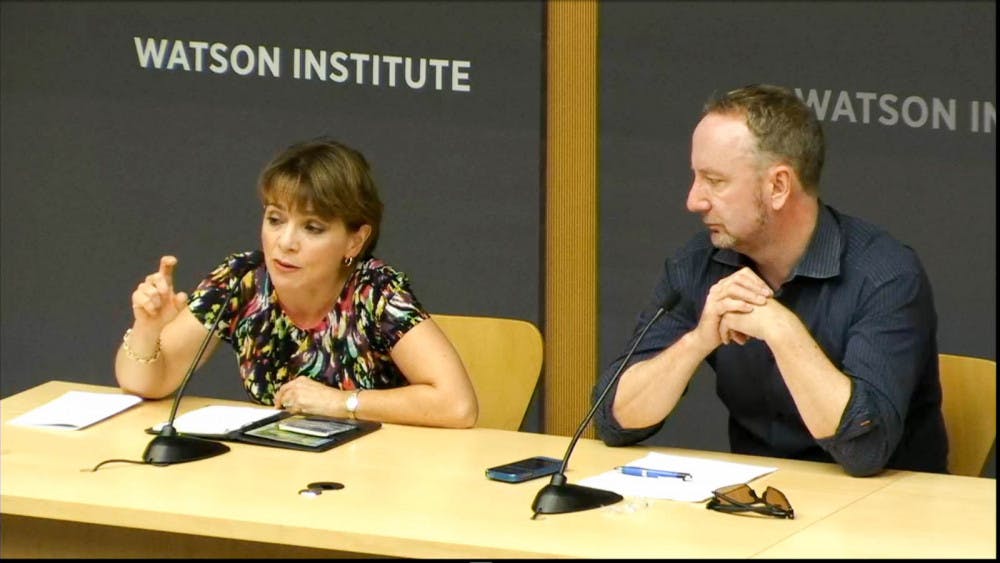Mark Blyth, professor of political science and international and public affairs, and Wendy Schiller, professor of political science and chair of the department and professor of international and public affairs, spoke about the state of the presidential race Thursday in the first of two lectures the pair will give about the 2016 election. While the lecture touched on a number of topics including foreign diplomacy and domestic policy, discussion settled repeatedly on the fact that both candidates are not ideal in the eyes of many Americans.
“This is the election of our discontent,” Schiller said, explaining that “there’s a good 30 to 35 percent of voters who are unsatisfied with their party’s nominee.” The discontent many Americans feel in response to the election is only magnified by candidates who facilitate these sentiments for political advantage, she added.
“The rhetoric employed by Donald Trump has exacerbated the discontent in some areas,” Schiller said, adding that his populist, anti-free trade mantra has made him an appealing option for many white, working-class manufacturers from the Southeast and Midwest who “feel really let down by the American capitalist and political system.”
On the other hand, Hillary Clinton has blundered in trying to cast a large swath of Trump supporters as racist and bigoted, saying on Sept. 9 that at least half of his backers could be placed into the “basket of deplorables,” Schiller said. “Using that phrase was a mistake,” she said, adding that Clinton should have simply asked Americans, “Which America do you want to be a part of?”
“If you castigate voters as racist and deplorable then they might become that even if they’re not,” Blyth said. He also questioned the efficacy of such a strategy, especially considering that it doesn’t, in his opinion, have a clear end goal. “If what’s driving this discontent is economic issues, then we can fix that,” Blyth said, “but if it’s the case that 15 percent of American voters are a lot more racist, then I don’t know what to do.”
Still, Blyth undercut the growing sense of doom many Americans have come to adopt this election cycle, declaring that history shows it’s never as bad as it may initially seem. Invoking his Scottish background, Blyth said that in many countries anxiety over the next American president is a perennial phenomenon.
“(George W. Bush) started a giant war in the Middle East, didn’t raise any taxes to pay for it and walked away as if nothing ever happened,” Blyth said. “If you survived him, you might survive Trump.”
But there was one issue that Blyth did find particularly worrisome this election cycle, what he called the “strange lovefest between Donald Trump and Vladimir Putin.”
“What if Trump believes Putin and thinks they’re good buddies?” Blyth questioned, adding that Trump’s emphasis on military spending could prove disastrous if a Putin emboldened by a faltering NATO provokes Trump on the global stage.
All of their hypotheticals aside, both Schiller and Blyth acknowledged that at this point in the race, it’s still impossible to predict who will prevail.
“Polls have gone up and down, and if you look at Obama and Romney in 2012, you will see poll numbers that look nearly identical” to today’s, Schiller said, adding that she doesn’t believe talk of voters switching parties over an undesirable candidate because “when we get closer to the election, people go home to their (parties).”
Still, some things can be gleaned from the race already, Schiller said, making note of the disparities that exist between Clinton’s elaborate campaign infrastructure and Trump’s comparatively minute ground operation. “If Hillary wins in November, it will be because of her campaign organization,” Schiller said.
But Clinton will be brought down if she doesn’t atone for past missteps, Blyth said. She must, for example, offer a “mea culpa” for economic policies she’s supported that have left many Americans without a seat at the proverbial table. Clinton’s position as a paid speaker at many financial institutions also raises questions, Blyth said.
“Clinton’s big vulnerability with me personally is that (she) talks to finance but won’t release the transcripts,” Blyth said. “I talk to finance, too; you can get all my transcripts,” he added, “I tell them what I tell you — they’re just dumb enough to pay.”
Blyth and Schiller will be giving the second and final lecture in their series Nov. 9. Taking place the day after the general election, their next talk will seek to explain the election’s results and discuss whether or not the next president is fit to meet the challenges of the office.
Correction: A previous version of this article stated that Wendy Schiller is a professor of political science and public policy. In fact, she is a professor of political science and chair of the department and a professor of international and public affairs. The Herald regrets the error.





